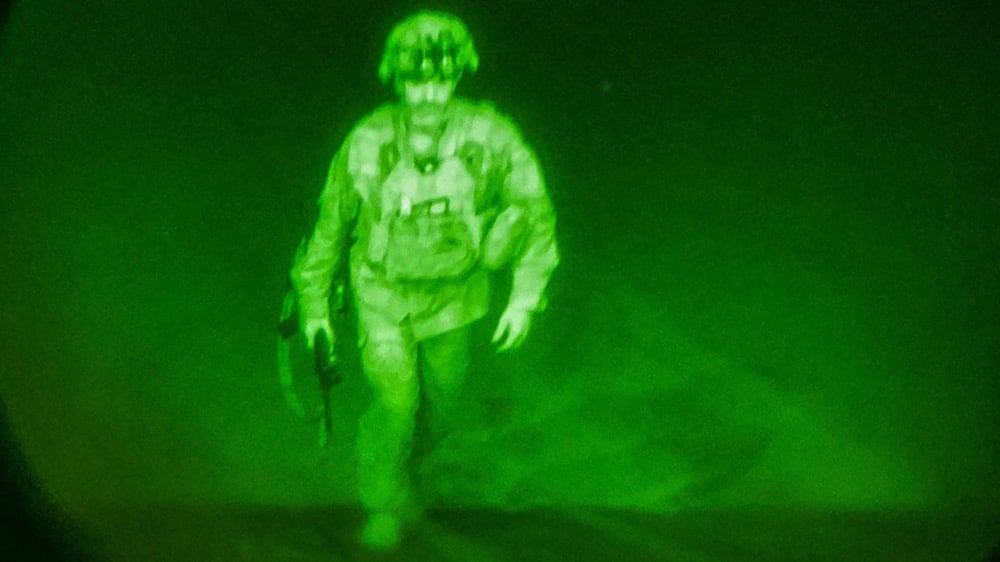Under the cover of night on August 30, 2021, Maj Gen Chris Donahue, commander of the US Army's 82nd Airborne Division, stepped on to a C-17 transport plane at Kabul airport.
A night-vision photograph of the soldier, rifle in hand as he walks up the plane’s rear entrance, is the last known moment an American solider had boots on the ground in Afghanistan, bringing an end to two decades of war spurred by the September 11, 2001, attacks.
Rodger Pinto, an activist for veterans who also served with the 82nd as an infantry paratrooper in Iraq and Afghanistan, watched from home as the chaotic US withdrawal from Kabul unfolded alongside the desperate evacuation of tens of thousands of people trying to escape the Taliban.
“I was very upset,” Mr Pinto told The National. “I understood the implications of that [moment].”
Mr Pinto, 35, was deployed to Ghazni province in south-east Afghanistan in 2012, halfway through the conflict that claimed the lives of more than 2,400 US troops.
He served as an infantry soldier during his tour of duty, but also worked within two advanced military teams that managed and carried out tactical operations inside Afghanistan.
His missions led him to work closely with America’s local allies, Afghans who served in roles including interpreters, field operatives and contractors who helped construct and maintain military bases.
“I had a wonderful experience working with the Afghans I was with,” he said.
Mr Pinto found a sense of camaraderie with his Afghan partners, with whom he would break bread and share conversations.
“We connected and engaged with each other on a human level and understood the magnitude of the situation that we were all in,” he said.

For those allies, though, making the choice to work with the Americans against the Taliban brought unique dangers, including to the lives of their family and friends.
“It’s a very dangerous decision to make,” he said. “It puts their entire livelihood at risk.”
Mr Pinto believes part of America’s mission in Afghanistan was to win the hearts and minds of its people, engage with the population, and speak to them beyond the realm of security and defence.
“A lot of servicemen took that to heart, too, and developed connections,” he said. “But the way we withdrew from Afghanistan goes against exactly how we were trained to operate in Afghanistan … we knew what that meant for people we’d built connections with.”
Tens of thousands of Afghans were brought to the US as part of Operation Allies Welcome, the official name of the US government’s Afghan assistance programme and the most significant resettlement effort since the Vietnam War.
But the speed at which the US left Afghanistan and the rapid Taliban takeover meant not everyone who had worked with the Americans was able to leave in time.
Some are still stuck in Afghanistan or neighbouring countries such as Pakistan or Iran. Many have been in hiding over the past two years or living in a state of legal limbo, unsure of their future.
In the run-up to the military drawdown, President Joe Biden made a promise to the Afghans who had worked alongside US forces during the war: America would take care of them.
“There is a home for you in the United States if you choose and we will stand with you just as you stood with us,” he said in July, 2021.
It is unclear what happened to any of the Afghans Mr Pinto worked with during his tour of duty – something he has found difficult to comprehend.
“I don’t know anything about any of the ones I was in contact with, I don’t know where they are and I don’t know what’s happened to them,” he said. “But I know what is happening in Afghanistan and that causes me great concern.”

This has led to a sense of “moral injury”, or a feeling of guilt, for Mr Pinto and other veterans of the war.
“Not fulfilling that commitment we made to our partners, the injury that has on our service members is significant,” he said.
Yet a bill currently working its way through the US Congress could rectify many of these problems and help Afghans stuck in limbo.
Similar to a plan unveiled after the Vietnam War, the Afghan Adjustment Act would amend some of the barriers in the US immigration system, giving Afghan allies a pathway to permanent residency.
“The speed at which our withdrawal occurred disrupted the ability for us to have an organised system in place to fulfil [our] promise,” Mr Pinto said. “This legislation would allow us to fix the issues we have in our own law.”
But the bill is currently stalled, and with divided government in Washington, as well as immigration being a touchy subject among American voters ahead of an election year, it has an uncertain future.

Mr Pinto, who now works for the advocacy group Iraq and Afghanistan Veterans of America, believes the legacy of the war in Afghanistan ultimately hinges on this promise.
“I wish we were able to get to a place here in the US where people understood how significant the problems are for the folks that we relied on to keep us safe when we were in Afghanistan,” he said.
“This is a moral decision for the United States … who do we want to be?”







